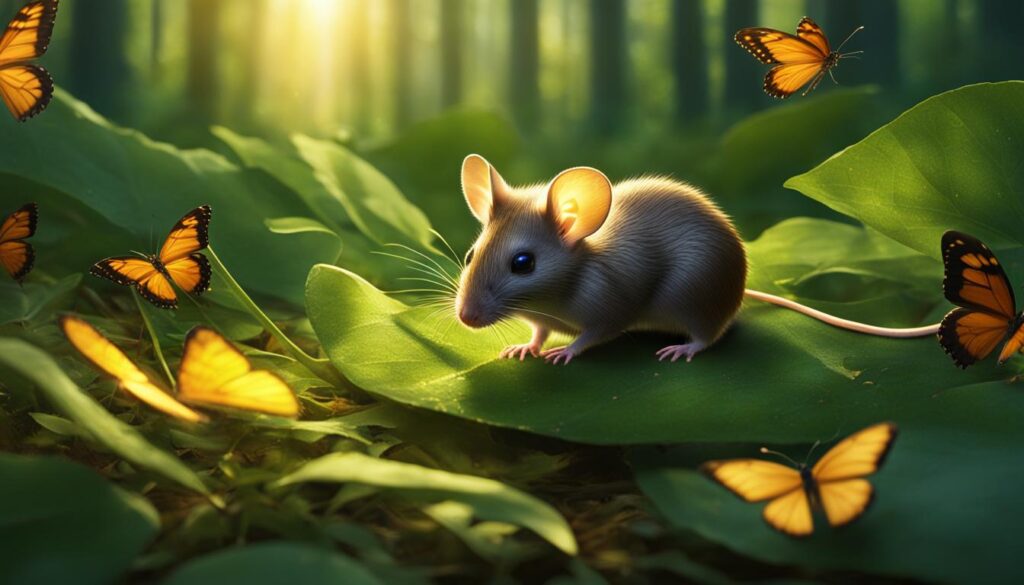Encountering a dead mouse, whether in the physical world or within the depths of a dream, can evoke a range of emotions and thoughts. As I recently found myself reflecting on a dream in which a dead mouse was a prominent feature, I began searching for an understanding that extended beyond initial discomfort. The presence of a dead mouse in my house carried potential spiritual meaning, beckoning me to consider broader interpretations. With my curiosity piqued, I delved into reliable sources to uncover the implications behind this symbol.
In my exploration, I discovered that the meaning of a dead mouse intertwines both the practical and the esoteric. While a dead mouse in a house could signal health concerns or cleaning necessities, spiritually, it could signify transformation or the need for introspection. This dream challenged me to confront subconscious messages and consider their significance in my waking life. The analysis uncovered not just a personal mythos but a resonance with collective cultural understandings of mortality and transition.
My careful examination was informed by data and facts, aided by expert opinions regarding the psychological and spiritual significance of such encounters. As I connected the dots between my dream and real-life situations, the symbolic depth of the dead mouse became clear, providing a tailored narrative rather than a generic interpretation.
Key Takeaways
- A dead mouse in a house invites a multidimensional interpretation, encompassing both health-related and symbolic aspects.
- My personal dream featuring a dead mouse prompted a journey to uncover its spiritual meaning in my life.
- The analysis of such dreams extends beyond surface-level discomfort, probing into psychological and emotional depths.
- Engaging with the dead mouse symbolism helped to bridge the gap between my subconscious dream world and conscious realities.
- Understanding these symbols demands attention to both personal intuition and cultural contexts, enriching the narrative with a more profound resonance.
- Expert insights and historical beliefs play crucial roles in lending weight and clarity to the interpretation.
Unveiling the Spiritual Implications of a Dead Mouse
Discovering a dead mouse can be an unsettling experience, yet this occurrence may carry profound spiritual symbolism that often goes overlooked. In my reflections, I delve into the spiritual meaning of a dead mouse, exploring its role as an omen and a bearer of subtle messages. Various cultures attribute different interpretations to this event—a spectrum from forewarning to transformation.
The dead mouse symbolism is not a one-size-fits-all; rather, it’s a tapestry woven with threads of cultural interpretations of a dead mouse. For example, some traditions view a dead mouse as a sign of an end to small worries or nuisances, paralleling the creature’s reputation for being a pest. In contrast, others might consider the death of such a small and quietly persevering animal as an advisory against overlooking minor details in one’s personal or professional life.
As a spiritual symbol, the mouse is often associated with resourcefulness and adaptability; the death of a mouse might suggest a forthcoming period where these qualities will be tested or no longer necessary.
Considering the layered dimensions of these signs, I often find it necessary to look beyond the initial shock to unveil messages that potentially resonate with my current life circumstances. The spiritual interpretation hinges upon personal belief systems, current events, and an openness to possibilities that transcend the physical.

- Cultural Context: The historical connotations of mice, whether as carriers of disease or as creatures highlighted in folklore, contribute to their modern spiritual symbolism.
- Personal Relevance: The context of one’s own life at the moment of finding a dead mouse can dramatically influence its spiritual meaning. What seems mundane to one may be a sign of transformation to another.
- Universal Symbols: Across different cultures, death represents change—a universal truth that manifests in the symbolism of a dead mouse, urging a deeper reflection on the transient nature of our concerns and life itself.
While spirituality often embraces the mystical and abstract, it’s intriguing to note how tangible and everyday occurrences like encountering a dead mouse can have an unseen, yet potentially significant impact. It’s the interpretation of these small moments that can reveal insights about our inner world and our journey through life.
| Culture | Symbolic Interpretation | Potential Personal Significance |
|---|---|---|
| Western | Ending of trivial disturbances | Period of relief from minor stresses |
| Eastern | Transition and transformation | Approaching personal evolution or change |
| Native American | Attentiveness to detail | Call to focus on overlooked aspects of life |
In closing this section of contemplation, it’s important to remember that the spiritual meaning of a dead mouse is multifaceted and deeply personal. Whether one sees it as a mere coincidence or a meaningful sign, the interpretation is ultimately in the eye of the beholder, drawing from the rich tapestry of cultural beliefs and individual life experiences.
Personal Dream Analysis: Finding the Meaning of Dead Mouse
My pursuit of understanding dreams led me to an introspective examination of a particularly striking dream featuring a dead mouse. Dreams, often a mirror to our subconscious mind, possess the capability to send symbolic messages which, upon discerning, can reveal significant insights into our waking life. Dream interpretation, especially around such stark images as that of a dead mouse, is not merely a speculative journey but a reflective exercise heavily rooted in symbolic meaning in dreams.

Deciphering My Dream: A Journey Through Symbols and Signs
Analyzing dreams like mine typically begins with recounting the personal dream experience. There I was, in a liminal space, confronting the deceased rodent. With each element of the dream presenting a potential subconscious sign, I leveraged the expertise of acclaimed dream analysts to navigate through the labyrinth of symbolic representation. They propose that animals in dreams often symbolize our primal instincts and a dead mouse might signify an ignored yet intrinsic part of our personalities or life situations needing attention.
Breaking Down the Elements: When a Dead Mouse Appears in Dreams
Breaking down my dream, I examined the emotions and settings accompanying the appearance of the dead mouse. Understanding dreams such as this involves appreciating the landscape and context. Was the mouse, for instance, a symbol of a gnawing issue in my subconscious, or perhaps an omen of transformation, as death in dreams often portends new beginnings? The real-life implications of dreams beckon such explorations to unpack the layered meanings.
Connecting Dream Interpretations to Real-life Situations
Lastly, I sought to connect the symbolism in my dream with real-world implications. Each aspect of the dream wove into the fabric of my day-to-day experiences, prompting me to question if this dead mouse was, in fact, a symbolic manifestation of any dormant fears or overlooked opportunities. By synthesizing insights from psychological case studies and dream symbolism application, such revelations become instrumental in my personal growth, guiding my actions beyond the subconscious world.
| Symbol | Common Interpretations | My Personal Reflection |
|---|---|---|
| Dead Mouse | End of an overlooked issue, unrecognized potential, or transformation. | A reflection of my unaddressed anxieties pertaining to change and personal progress. |
| Setting in Dream | Context for the symbol, indicate emotional or psychological states. | The liminal space suggested familiar yet uncharted territories in life, intersecting my comfort zone and desire for change. |
| Emotions in Dream | Fear, curiosity, or apathy can unveil inner feelings towards real-life situations. | Unexpected calmness, hinting at my subconscious readiness to confront the impending changes. |
The Psychological Resonance of Encountering a Dead Mouse
When I stumble upon a dead mouse, the emotional impact is immediate and often unsettling. My visceral reaction includes disgust and fear, yet there’s also a pique of intrigue about the presence of death so close to life’s everyday routine. This incident has propelled me into exploring the psychological meaning of death, and particularly, how hidden symbolism can provide insights into my own psyche.
Emotional Responses and Hidden Meanings
The immediate emotions triggered by discovering a dead mouse are complex. I experience an instinctual aversion that is connected, according to psychology texts, to an ingrained survival mechanism. Scholarly articles on the symbolism of rodents suggest these creatures can evoke subconscious associations with disease or uncleanliness. My response, and likely that of others, taps into deep-seated emotions and hidden symbolism that tie into broader themes of life and vitality versus decay and endings.
Scientific Insights: How Our Psyche Processes Death and Decay
Digging further into this subject, I’ve looked at how my reaction aligns with the scientific understanding of decay and the universal psychological processing of death. Behavioral studies have highlighted how encountering signs of mortality like a dead mouse can elicit a common set of responses across cultures. Neurological research adds another layer, showing that morbid imagery can trigger specific brain activity related to threat perception and emotional coping mechanisms.
Cognitive Reflections: What a Dead Mouse Can Teach Us About Ourselves
But beyond my initial reaction, there is room for self-reflection through symbolism and personal growth. The dead mouse serves as a sobering reminder of life’s fragility, prompting me to ponder my own existence, beliefs, and behaviors. Philosophical texts on animal symbolism in self-awareness have been instrumental in shaping these reflections. These moments of introspection are opportunities for learning from death symbolism, understanding mortality, and embracing the push towards personal understanding and development.